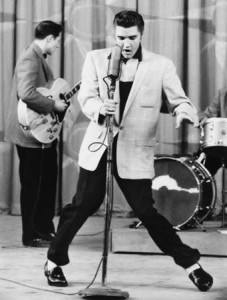On this date in 1977, Elvis left the building for good.
He was found face down in his bathroom at Graceland. The official cause of death was heart failure. He was forty-two years old.
Elvis immediately took up residence in the pantheon of pop culture icons. The Soviet newspaper Pravda announced that America could be thanked for three things: Mickey Mouse, Coca-Cola and Elvis Presley. A new industry – Elvis imitation – sprang up, bringing employment to thousands. In fact, everyone started doing Elvis, even around the office. How many times have you heard a fellow worker give the Thank you. Thank you very much line over some trivial favor?
Last month I went to a Dodger game with a friend. I thought it was just going to be baseball. But it was “Elvis night.” Elvis songs were featured between innings, and numerous fans were decked out in Elvis regalia—fake sideburns and sunglasses and big black wigs.
And every time the JumboTron showed one of these ersatz Elvises, the crowd would go wild.
Thirty-two years after his death.
A true American original, Elvis. Yeah, you kind of have to overlook the years he made such masterpieces as Harum Scarum and Change of Habit. And we all know his last years were not happy ones, on the concert stage or in his personal life.
But early on, moving and shaking, all that energy and appeal and singing ability, that was true Elvis. The Elvis who amazed Sam Phillips and blew away Roy Orbison, not to mention sixty million viewers of the Ed Sullivan Show. The Elvis poignantly recaptured in his 1968 “comeback” special.
There are no guarantees in the arts. But the ones who make it big usually do so by finding that spark of originality within them—that certain passion that ignites their creativity—and wedding it to a practical look at the commercial marketplace.
You want to sell? You have to do both. When you write, you should feel a little like 50’s Elvis. Shake it, go for broke. Give freedom to your voice and vision, the twins that make up the definition of originality. As Elvis put it in a 1956 interview, “Some people tap their feet, some people snap their fingers, and some people sway back and forth. I just sorta do ’em all together, I guess.”
To break through, you have to find out what it is you do well “together,” and do it for all it’s worth.
But you also need a little “Colonel” Tom Parker in you, understanding that publishing is indeed a business, and you are offering a product for consumers.
It’s an ongoing balancing act. You must never let your desire to be published drain you of your spirit and singularity (your inner Elvis). But if you want to be published by someone other than Kinko’s, you need market sense, too.
So how do you find the right mix in your own writing? Do you think about both sides of the equation early and often? Or does doing so get you all shook up?
Don’t be cruel. It’s now or never. Discuss.

